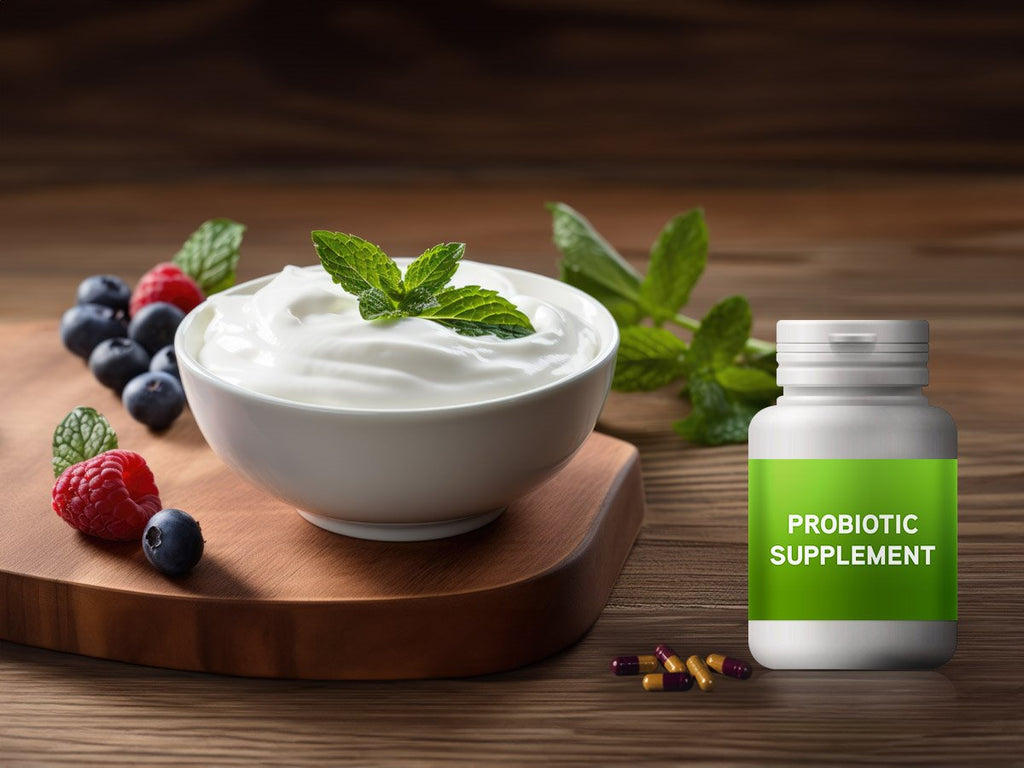Yogurt Vs. Probiotic Supplements: Which Is Better?

We all know that our yummy, delicious yogurt is a probiotic diet. It contains healthy bacteria that are good for your gut, improving digestion and immune function, and has a lot of other health benefits. But, you may ask, what are probiotics in the first place?
Well, our gut has billions of microorganisms containing live bacteria. These ‘friendly’ bacteria, known as probiotics, provide several health benefits to the body. They help cure indigestion, including regularizing bowel movement, reducing intestinal discomfort, and strengthening immune function.
It is for these reasons that probiotics are often prescribed by doctors for a healthy gut and better digestion. Let’s delve deeper into the differences between yogurt, a natural source of probiotics, and probiotic supplements, which provide concentrated doses of beneficial bacteria.
Yogurt Vs. Probiotic Supplement
Probiotics are often found in fermented foods like yogurt and yeast. They are also available to consumers as supplements. Today, these supplements are available in plenty in over-the-counter stores and other marketplaces. However, they are naturally found in yogurts.
Despite the choice, people still debate which is better between yogurt and probiotic supplements.
Most of us accept that homemade yogurts made from yogurt starters, free of artificial ingredients and flavoring, are better alternatives than store-bought ones. But, when deciding between yogurt and probiotic supplements, we need to dig in more.
This article will delve into the characteristics and merits of each probiotic source - yogurt and probiotic supplement, so you can decide which is better for you.
Probiotics From A Yogurt
There are some clear benefits of probiotics from yogurt. Let us see some of them below:
- Natural Fermentation
Since probiotics are live microorganisms, they are naturally formed while food is fermented. The yogurt-making process facilitates this naturally occurring phenomenon.
While this may not be the case for every store-bought yogurt, a yogurt made in your home with a yogurt starter facilitates natural fermentation, thus letting the bacteria germinate naturally.
- Variety of Bacterial Strains
On the other hand, not all yogurts are made the same. Since yogurts are made by fermenting the milk, a lot of its quality, texture, taste, and nutritional benefits depend on the quality and type of the milk used for fermentation.
For example, yogurt made from vegan or plant-based milk may differ from that of animal-based milk. Similarly, yogurt starters also have a role to play in them. A vegan yogurt starter can be used to make both vegan and non-vegan yogurt.
Some argue that since not all yogurts are the same, their collection of bacterial strains is not uniform. On the other hand, this may be a good thing too. As we get a variety of different yogurts, so we also get various nutritional values from them, including their unique bacterial strains.
- Other Nutritional Values
Apart from being a good source of probiotics, yogurt is also rich in calcium, potassium, various essential minerals, and vitamins, especially B-complex vitamins. It is also a rich source of essential fatty acids, which are good for mental health.
Probiotics From A Supplement
Let's explore probiotics found in supplements:
-
Suitable For People With Lactose Intolerance
Probiotic supplements came into existence to fulfill a demand for probiotic consumption among people with difficulty consuming yogurts or other fermented foods.
The reasons could be many. For example, someone may have a lactose intolerance, where they may find it difficult to digest the lactose or sugar in a dairy product (milk, yogurt, etc.).
For such people, consuming a probiotic supplement is the better alternative for replenishing the body with the required probiotic dosage.
- Uniform Strains of Probiotic Bacteria
Since yogurts are made in different ways with various ingredients, their outcome may not remain the same. As a result, the bacterial strains expected to be found in yogurt may vary.
For example, yogurt usually contains two major bacterial strains, viz., Lactobacillus bulgaricus and Streptococcus thermophilus.
Therefore, consuming probiotic supplements alongside yogurts may be beneficial for health in certain cases. For example, if you are on an antibiotic, it may cause indigestion.
Doubling the dose of probiotics while you are under medication may ease the symptoms. However, proper consultation with a medical professional is always recommended.
Yogurt Starter with Probiotic Strains
A yogurt starter, also known as starter culture, is a blend of live bacteria that helps the milk to ferment and convert into a yogurt naturally.
The bacteria in these starter cultures consume the sugar or lactose in the milk, which causes a change in its protein content, ultimately creating a thick, tangy, gel-like substance, which is known as yogurt.
Gi ProStart yogurt starter is a gluten-free yogurt starter consisting of vital probiotic strains that are good for health. Being dairy-free and plant-based, our starter culture can be used to make yogurt from any type of milk, including cow, goat, soy, and nut.
The Verdict
Both yogurt and probiotic supplements offer various benefits for improving gut health. However, after considering all factors, the preference leans towards yogurt, particularly when you use a yogurt starter with probiotics strains.
If you have specific health issues, a probiotic supplement can be a viable alternative. However, including yogurt in their daily diet provides beneficial bacteria, additional nutrients, and potential digestive support.
